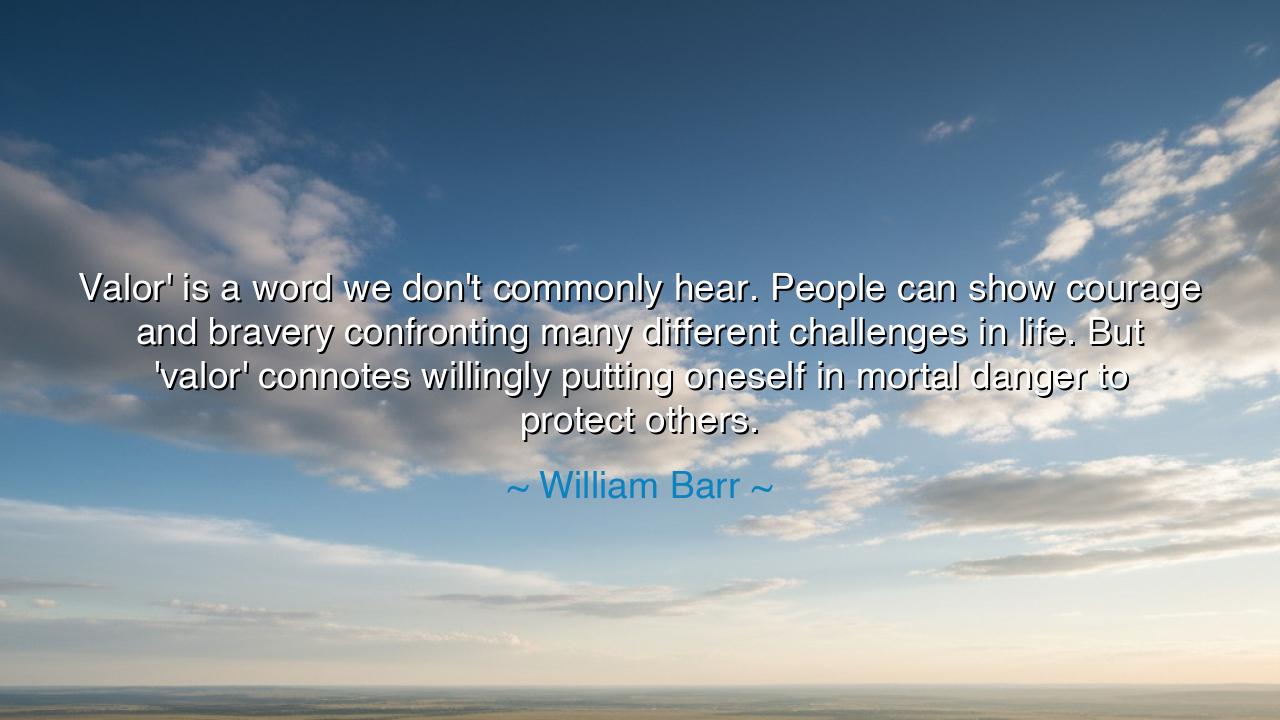
Valor' is a word we don't commonly hear. People can show courage
Valor' is a word we don't commonly hear. People can show courage and bravery confronting many different challenges in life. But 'valor' connotes willingly putting oneself in mortal danger to protect others.






When William Barr declared, “‘Valor’ is a word we don’t commonly hear. People can show courage and bravery confronting many different challenges in life. But ‘valor’ connotes willingly putting oneself in mortal danger to protect others,” he spoke not merely of heroism, but of the sacred essence of sacrifice. His words summon an ancient and noble idea—that there exists a form of courage so pure, so selfless, that it transcends the ordinary trials of human life. Valor, unlike everyday bravery, does not arise from necessity or ambition; it is a conscious offering of one’s own safety for the good of another. It is the act of standing firm before the shadow of death, not for glory, but for love.
Barr’s reflection reminds us that in an age of comfort and convenience, the word valor has grown rare, not because it has vanished, but because few dare to live it. We speak often of bravery—of overcoming fear in pursuit of dreams, or of enduring hardship with grace. These are noble qualities indeed, but valor belongs to a higher realm of the spirit. It is the courage of the protector, the guardian, the one who stands between danger and the defenseless. It is the choice to face annihilation, not for self, but for others. And in that choice lies a light so radiant that it becomes eternal.
The origin of this truth lies deep within the story of humankind. From the dawn of civilization, the warriors and defenders of the innocent were revered not merely for their strength, but for their willingness to die that others might live. The ancients carved their names upon stone, not to honor conquest, but to honor selflessness. In the Roman tongue, virtus—from which we derive “virtue”—meant both courage and moral excellence, for the ancients knew that true bravery must serve goodness. Valor, then, is not merely the act of fighting; it is the act of choosing to place one’s own life beneath the shield of duty and compassion.
Consider the tale of Desmond Doss, a simple medic in the Second World War who refused to carry a weapon yet charged into battle to save his brothers in arms. At the Battle of Okinawa, as bullets rained like iron hail, Doss lowered seventy-five wounded men from the ridge to safety, whispering after each one, “Lord, help me get one more.” He did not fight for vengeance or glory; he fought for life itself. That is valor—not the power to destroy, but the power to protect. His actions, born of quiet conviction, echo the ancient understanding that to risk oneself for another is the highest expression of the human soul.
Barr’s words also hold a mirror to our times. He reminds us that though most of us may never face mortal combat, we are still called to live with valor of the heart. The firefighter who runs into a burning home, the doctor who risks contagion to heal the sick, the teacher who stands up for a child in danger—these too are acts of valor. In a world often obsessed with self-preservation, it is easy to forget that the greatest measure of a life is not what one gains, but what one gives. Valor may seem distant, but its spirit is alive wherever love conquers fear.
In the wisdom of the ancients, valor was not only physical but spiritual. It demanded not just the strength to act, but the purity of motive that makes action noble. Courage may face danger; valor faces it with honor. The warrior who fights for conquest is brave; the one who fights to save is virtuous. This is why valor is so deeply revered: it is the triumph of goodness over instinct, of compassion over fear. It is the moment when humanity proves itself divine.
So, my children of peace and struggle, take this teaching to heart: though not all are called to the battlefield, all are called to be guardians of one another. Live with a spirit of valor, even in small things. Defend the truth when it is threatened. Protect the weak when they are ignored. Step forward when others shrink back. You may not face mortal danger, but you will face moments that test your integrity, your empathy, your courage. And when you choose to act not for yourself, but for the good of others, the same flame that burned in heroes past will burn in you.
For in the end, as William Barr reminds us, valor is not only about dying bravely—it is about living selflessly. It is the sacred act of saying, “My life is worth less than the life I can save.” Let this truth be your armor and your guide. For though the word may be seldom heard, its power remains eternal—and those who live by it, even quietly, are the true keepers of the world’s light.






AAdministratorAdministrator
Welcome, honored guests. Please leave a comment, we will respond soon